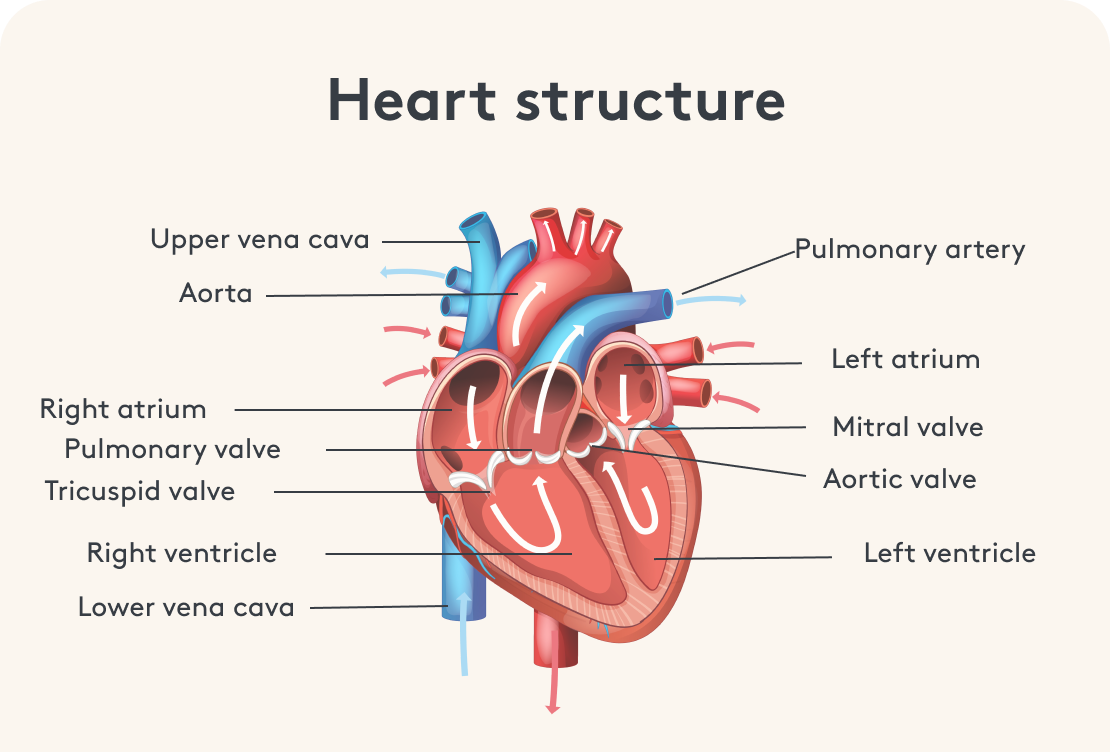Themen dieses Blogartikels:
Table of contents
- Why a strong cardiovascular system is so important
- Simply explained: How the heart works
- What happens if the heart doesn't function properly?
- These taboos promote cardiovascular problems
- Everyday measures for a strong heart
- Lever 1: Strengthen your cardiovascular system with exercise
- Which sports and training methods are recommended?
- Lever 2: Use relaxation to protect your heart
- Lever 3: Strengthen the heart with nutrition
- Why are omega-3 fatty acids important?
- When do I need supplements to strengthen my heart?
- What effect does cholesterol have on the heart?
- Many tips, one goal: A strong heart
- Sources & Bibliography
Why a strong cardiovascular system is so important
Cardiovascular diseases are the number one cause of death in Germany.¹ The heart is one of the body's most important organs. It is the engine of our life and the center of the circulatory system: Every day, it beats around 100,000 times and pumps approximately 7,000 liters of blood through the body,² ensuring that all cells, organs, and muscles are supplied with sufficient oxygen and nutrients.
Simply explained: How the heart works
The heart consists of two atria at the top and two ventricles at the bottom. The right side of the heart receives deoxygenated blood from the body and pumps it to the lungs, where it is enriched with fresh oxygen. The left side receives the oxygen-rich blood and sends it throughout the body via the main artery (aorta).
Between the chambers and at the exit of the major blood vessels are heart valves that act like valves to direct blood in the right direction and prevent backflow. For the heart to function properly, it must beat regularly. The electrical impulse for this is provided by the sinus node, a collection of specialized cells.


What happens if the heart doesn't function properly?
When all the chambers, valves, and vessels are working in sync and working together, your cardiovascular system functions well and you perform at your best. However, if the blood circulation isn't functioning properly, it can lead to reduced performance , exhaustion, and, over time, even to heart conditions such as heart failure, heart weakness, or coronary heart disease.
These taboos promote cardiovascular problems
There are various causes of heart disease. This list isn't surprising, but you should still be aware of them:
- Smoking damages the blood vessels that are important for the supply of oxygen, can contribute to calcification of the arteries and increase blood pressure
- Excessive alcohol consumption weakens the heart muscle and increases the risk of cardiac arrhythmias.
- Lack of exercise causes the heart and blood vessels to age faster and increases the risk of cardiovascular diseases
- Sugar can promote high blood pressure and cause vascular damage
Everyday measures for a strong heart
Strengthening your heart is the best form of prevention . Studies show that improved cardiac performance is associated with a longer life expectancy and a better quality of life.³ There are various levers you can use to keep your heart fit and functioning properly.
Lever 1: Strengthen your cardiovascular system with exercise
You can challenge and train your heart muscle with exercise just like you would your biceps. Training in different heart rate zones is particularly effective. Heart rate indicates how many times your heart beats per minute. This rate changes depending on how intensely you train.
An important guideline is your maximum heart rate , the highest heart rate you can theoretically achieve when exerting yourself to the maximum. A rough rule of thumb for calculating this is: 220 minus your age. So, if you're 30 years old, your maximum heart rate is around 190 beats per minute.


Which sports and training methods are recommended?
If you want to strengthen your heart, you should train primarily in the aerobic range to reach around 60 to 80% of your maximum heart rate. You should also regularly incorporate interval training into your training plan. This will improve your VO₂ max , which indicates how well your body can absorb and utilize oxygen during exercise.
The higher the value, the more efficiently your heart and muscles work. VO₂max is considered an important key to longevity and an indicator of how fit and resilient your body is overall.⁴
This is what a weekly workout could look like to achieve positive effects for the heart:
- Basic endurance training two to three times a week
- Once a week interval training to improve VO₂max
Tip: To improve heart health, the World Health Organization (WHO) recommends at least 150 to 300 minutes of moderate-intensity exercise per week, such as brisk walking or light jogging. For more intense activities like running or fast cycling, 75 to 150 minutes is sufficient. Additionally, you should incorporate strength training at least two days per week to support your muscles and cardiovascular system.⁵
Lever 2: Use relaxation to protect your heart
How often have you experienced your heart beating faster and your pulse racing during stressful moments? Stress puts a strain on the heart , and not just temporarily. It can also have long-term consequences for your well-being: Chronic stress increases blood pressure and promotes inflammatory processes that weaken the cardiovascular system over time.
To reduce stress and protect your heart, you can try the following:
- Meditation can help reduce subjective stress levels and blood pressure⁶
- Yoga can improve blood pressure, body mass index, and cholesterol levels⁷
- Sleep is important for the body's regeneration – too little sleep increases the risk of cardiovascular disease or stroke⁸
- Reading tip: Find out what you can do to ensure restful sleep so that your body can regenerate even better overnight.
Lever 3: Strengthen the heart with nutrition
Nutrition is fundamentally important for well-being and therefore also for heart health. What you eat affects not only your weight and blood sugar, but also your blood vessels and blood lipid levels .
You should avoid highly processed, fatty and sugary foods as much as possible and instead eat fresh, nutrient-rich foods , for example:
- Anti-inflammatory foods such as berries, turmeric and green leafy vegetables fight silent inflammation in the body
- Antioxidant-rich diets such as dark vegetables and healthy fats prevent oxidative stress
- Omega-3 fatty acids , which are found in fatty fish such as salmon, ensure, among other things, that your blood can flow better
- Proteins from plant or high-quality animal foods contain amino acids and support cell regeneration and muscle metabolism
Why are omega-3 fatty acids important?
Omega-3 can protect your heart and blood vessels: According to a meta-analysis, people who took omega-3 reduced their risk of heart attack, heart disease, and death from heart problems. It also showed that the higher the dose, the greater the protective effect.⁹
Reading tip: In our blog you will learn everything you need to know about the benefits and recommended dosage of Omega 3 .
Advertisement
300 ml Premium Natural Omega 3 Oil from sustainable wild catch
1460mg EPA and 910mg DHA
-
Natural 1.6:1 ratio
Fatty acid complex of 27 fatty acids
Lemony, pleasant taste, no fishy taste
Totox value of 7.7 & purified from heavy metals & Co
Laboratory tested
Developed with doctors & experts

When do I need supplements to strengthen my heart?
Diet, exercise, relaxation – the list of measures for better heart health is long. To integrate these into your daily routine, you can give your heart an additional boost with dietary supplements:
- Omega-3 can contribute to the maintenance of normal heart function
- Vitamin B1 can contribute to normal heart function
- Vitamin C can support the normal function of blood vessels
- Iron can support normal formation of red blood cells and hemoglobin and normal oxygen transport in the body
- Vitamin B9 contributes to normal blood formation
- Vitamin B6 and vitamin B12 contribute, among other things, to the normal formation of red blood cells
What effect does cholesterol have on the heart?
You may have heard that high cholesterol levels are associated with a high risk of heart disease. However, cholesterol alone doesn't provide a complete picture of your heart health—it's important to take a closer look and consider the following:
- LDL cholesterol (LDL-C): An elevated level indicates that there is a lot of “bad” cholesterol in the blood, which can build up in the blood vessels and cause atherosclerosis
- Apolipoprotein B (ApoB): This value indicates how many harmful LDL particles are in the blood
- Lipoprotein(a): A specific lipoprotein that, when elevated, increases the risk of heart disease. This value is relevant if there is a family history of the condition.
To protect your heart, it's a good idea to aim for a low LDL-C level. Physician and internist Dr. Ulrich Strunz recommends an ideal level of around 10 to 20 mg/dl, which is equivalent to a baby's. You can learn more about this in his book " 77 Tips for a Healthy Heart " or in his podcast.
Many tips, one goal: A strong heart
There are many ways to do something good for your heart. Whether it's exercise or relaxation, the main thing is to start right away. With regular exercise, a proper diet, and a relaxed lifestyle, you'll lay an important foundation and can use supplements if needed. If you also avoid risk factors, your heart will thank you.
This article is based on carefully researched sources:
Sources & Bibliography
- rki.de/DE/Themen/Nichtueberkommunikbare-Krankheiten/Koerperliche-Gesundheit/Herz-Kreislauf/herz-kreislauf-erkrankungen-node.html
- kardiologe-bayreuth.de/herz-fakten/
- Laukkanen JA, Isiozor NM, Kunutsor SK. Objectively Assessed Cardiorespiratory Fitness and All-Cause Mortality Risk: An Updated Meta-analysis of 37 Cohort Studies Involving 2,258,029 Participants. Mayo Clin Proc . 2022;97(6):1054-1073.
- Strasser B, Burtscher M. Survival of the fittest: VO2max, a key predictor of longevity?. Front Biosci (Landmark Ed) . 2018;23(8):1505-1516. Published 2018 Mar 1.
- aerzteblatt.de/news/who-gives-new-activity-recommendations-for-health-every-movement-counts-35fe8935-43d0-4130-b000-ae2f7994608e
- El-Malahi O, Mohajeri D, Bäuerle A, et al. The Effect of Stress-Reducing Interventions on Heart Rate Variability in Cardiovascular Disease: A Systematic Review and Meta-Analysis. Life (Basel) . 2024;14(6):749. Published 2024 Jun 12.
- Chu P, Gotink RA, Yeh GY, Goldie SJ, Hunink MG. The effectiveness of yoga in modifying risk factors for cardiovascular disease and metabolic syndrome: A systematic review and meta-analysis of randomized controlled trials. Eur J Prev Cardiol . 2016;23(3):291-307.
- Nagai M, Hoshide S, Kario K. Sleep duration as a risk factor for cardiovascular disease- a review of the recent literature. Curr Cardiol Rev. 2010;6(1):54-61.
- Hu Y, Hu FB, Manson JE. Marine Omega-3 Supplementation and Cardiovascular Disease: An Updated Meta-Analysis of 13 Randomized Controlled Trials Involving 127 477 Participants. J Am Heart Assoc . 2019;8(19):e013543.

















